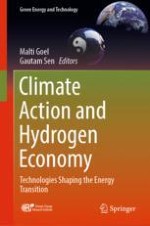2024 | OriginalPaper | Buchkapitel
The Net Zero Goal and Sustainability: Significance of Green Hydrogen Economy in Valorization of CO2, Biomass and Plastic Waste into Chemicals and Materials
verfasst von : Ganapati D. Yadav
Erschienen in: Climate Action and Hydrogen Economy
Verlag: Springer Nature Singapore
Aktivieren Sie unsere intelligente Suche, um passende Fachinhalte oder Patente zu finden.
Wählen Sie Textabschnitte aus um mit Künstlicher Intelligenz passenden Patente zu finden. powered by
Markieren Sie Textabschnitte, um KI-gestützt weitere passende Inhalte zu finden. powered by
Abstract
-
Significance of green hydrogen economy in achieving net zero
-
Green ammonia and CO2
-
as future fuels for sustainability
-
Chemical recycling approaches of producing fuel from waste and plastics
-
Cost-effective green hydrogen production at the ICT, Mumbai, India
